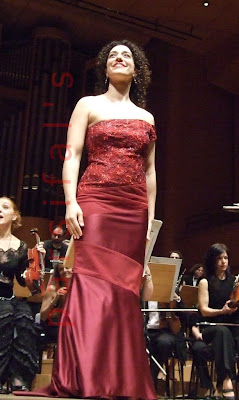 Mata Katsuli as Mimi
Mata Katsuli as MimiConvincing 12 colleagues to follow me on a Night at the Opera was easier than I thought. A message with 18 recipients led to 12 positive RSVP. A couple of them would even join us with their boyfriends/girlfriends.
The choice of the opera was not random: I always considered Puccini's masterpiece a great introduction to the world of opera, I had watched Graham Vick's modern mise-en-scène a couple of years ago and loved it and I was thinking that even if it wouldn't impress them, they would certainly identify more with this one than with a typical Boheme with top hats and crinolines. In order to avoid disappointments I had already warned them that they should not expect a typical staging .

On the other hand, I wanted them to watch a fresh and young cast with great voices thus from the beginning I organized our little excursion around Sebastian Guéze who would sing Rodolfo and Mata Katsuli who would be our Mimí. Unfortunately, Guéze's participation was cancelled due to financial reasons (the Greek National Opera goes through the worst period of its history as the debt has reached 14 million euros) and after my original frustration, I dealt with the fact that Greek tenor Yannis Christopoulos would be our Rodolfo.
 Yannis Christopoulos and Mata Katsuli
Yannis Christopoulos and Mata KatsuliI must admit that my colleagues surprised me positively: they were extremely well behaved, no chatting, no texting, no coughing - instead they looked very absorbed to what they were watching.

Vick's direction is simple, fresh, modern, dynamic, insired by his night walks in Athens - ideal for an athenian newcomer to the Opera. Ideal seemed to be the cast as well: Mata Katsuli was a sensational Mimí, Yannis Christopoulos was a well-sung Rodolfo (even if his constant use of forte and the lack of mezza voce was tiring), Kyros Patsalides was an excellent Marcello, Lukia Spanaki impressed as Musetta, Tasos Apostolou could make rocks move with his "Vecchia Zimarra" and Haris Andrianos was an ideal, hyper-energetic, hilarious Schaunard.
Curtain Calls:








After the performance I avoided to ask my friends for their impressions, I knew I would have time to do it once the experience had settled in them. However I was deeply moved when a colleague hugged me and said "I'm in shock, I have been having goosebumps for over 2 hours, I didn't expect that I would love it so much...".
 Kyros Patsalides as Marcello
Kyros Patsalides as Marcello Lukia Spanaki as Musetta
Lukia Spanaki as Musetta
 Haris Adrianos as Schaunard
Haris Adrianos as Schaunard~.~
2 days later, I randomly picked 4 of my colleagues that attended the event and asked them to write within just a sentence what they liked most and what they liked least.
The Verdict:
1) Female, in her 30's
Most: The tall bearded guy (*bass Tasos Apostolou*)
Least: His Birkenstocks
 (The tall guy and his Birkenstocks)
(The tall guy and his Birkenstocks)2) Male, 30
Most: the magic on stage and the music
Least: Parts of the subtitles were at times hard to follow
3) Female, 28
Most: I loved the whole experience
Least: I found Rodolfo's attitude a bit weird during Act IV as it was discontinous to what had happened previously on stage (*in Vick's direction, Rodolfo stays away from Mimi during Act IV, no hugging, no kissing, no consolation, Rodolfo falls on his knees only to embrace Mimi's dead body*)
4) Female, 30
Most: the voices and the music
Least: the sets and my impression that the physical appearance of some singers did not match their character (*ha! she hasn't seen Caballé singing Salome*)
Obviously the looks DO matter (if there was a doubt). Hopefully there will be a sequel to this experiment and my friends will return to the Opera - with or without my involvement. Definitely it was a wonderful evening. Undoubtely the Greek National Opera deserves a future.























































.jpg)




















